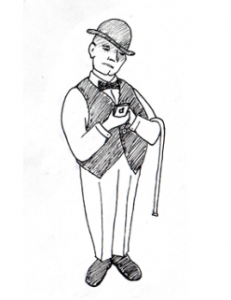Lindsay Peters
Why We’re Obsessed with the Past and the Present and Why That’s Okay
My friend hates her neighbors. Living on campus at Pratt University, she is plagued by a classic dorm problem: loud music. Every weekend in the wee hours of the morning, the smooth timbre of the late crooner Frank Sinatra erupt through her walls from the adjacent room. Instead of the newest Williamsburg band or Top 40’s song, her neighbors turn up Old Blue Eyes as loud as the speakers will go. To me, the thought of a group of art students, most likely aged 18-24, blasting music from an era not even their parents can remember testifies to our culture’s widespread nostalgia.
A longing for music, culture, a place, thing or even smell from a past era characterizes nostalgia. A concept sneered at by baby boomers, thinking we’re dwelling in the past. This desire isn’t a contemporary concept, but it is one we’re embracing harmlessly. Yes, we are a generation of straight-across bangs that Betty Paige would be proud of and cat-eye makeup. We want the most authentic vintage find, but the very latest smartphone. We love going back but not at the expense of going forward.

Instead of completely regressing, nostalgia these days fits snuggly into the 20 Century. On Facebook, we can “like” and re-blog posts to remind each other of the little pleasures we twenty-somethings had growing up. The video game console Nintendo 64 (circa 1996) has around 1.4 million likes, while the 1991 cartoon Rugrats claims over 7 million. We refurbish nineties cartoons into Internet memes at faster speeds than ever existed at that time and with no dial up. Apps like Instagram and Hipstamatic are popular because they fabricate the effects found in old medium-format film cameras like Brownies, Holgas, and Hasselblads, all in an iPhone app. With the apps Historypin or Streetmuseum you can view a map of your current neighborhood layered with the faded photographs of what used to be there. This generation doesn’t dwell solely in the present or past. We tour both.
In entertainment, the marriage of old and contemporary is apparent. Street Fighter, Pac Man and the rest of the arcade culture from the 1970s, 80s and 90s filled last year’s Pixar movie, “Wreck it Ralph” with the high quality animation Pixar pioneered. Popular dramas like Mad Men set in the 1960’s, Boardwalk Empire during Prohibition and Downton Abbey during World War I receive praise for their intricately-built sets and costumes just as much as their plots and characters.
As a photo student beginning with 35mm film and hard-pressed to let it go, I embrace the combination of nostalgia with modern technology. The darkroom process for printing color slides is virtually extinct but advances in scanners keep color film a viable medium. I’m also happy shooting with a vintage Hasselblad camera and attaching a digital adaptor instead of tracking down 120mm film.
Nostalgia isn’t a wrench thrown into our technological machine. We see our nostalgia through the lens of present-day comforts like laptops, apps and mp3 players. We may own a rotary telephone but when we’re out trying to navigate Brooklyn we realize how necessary a GPS is. We’re reblogging our favorite old photographs, tweeting about those memories from childhood and downloading our favorite entertainment from the “good old days.” We haven’t regressed back into a fantasy where we don’t need advances in medicine, technology and social rights. Women are comfortable wearing retro dresses and pillbox hats with no desire to relinquish the social independence of the present and not available in the 1950s. Taking cues from a time we’ve never been a part of isn’t a farce, it’s discovering a culture that’s new and foreign.
We’re escaping through our choice of clothes, music, and art by identifying with a time we will never see. We’ll continue using apps and computers to make our everyday snapshots look straight out of our grandparent’s photo album. My friend’s neighbors will continue to use modern stereo systems to play old music at ear-shattering levels. This escapism isn’t negative. We keep one foot always grounded in the present. Nostalgia is the easiest and — in terms of thrift-shopping — the cheapest form of a vacation.







Leave a Reply